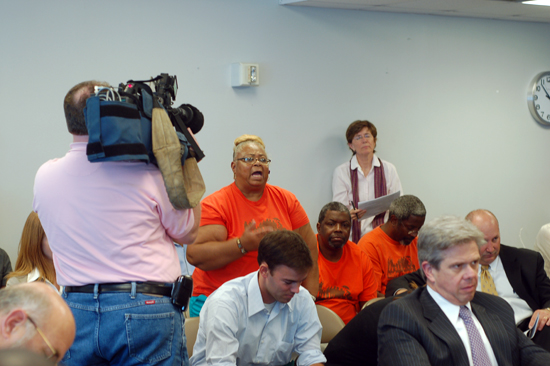Sheriff Marlin Gusman committed to build a smaller jail complex today if data analysis by Mayor Mitch Landrieu’s new working group supports one.

Gusman was asked the question point blank by Titus Lin from the Louisiana Justice Institute at the first meeting of the working group this afternoon.
“Yes, yes,” Gusman said. “I’ve always advocated for a smaller facility…it’s a shame that people have misrepresented my position. We only want to have a jail to house the violent offenders. That’s all we want.”
Gusman also responded in the same vein to Fannie McKnight, a community activist from nonprofit Voice of the Ex-Offender.
“We need a jail, but not the kind of jail that Gusman wants,” McKnight said, during the question and answer period.
“Oh no, no, no, no,” Gusman said. “Fannie, I have never ever said I want a big jail.”
Mayor Landrieu convened the jail working group in September, in response to public pressure for more public input into the jail planning process.
The group will now look at data analyzed by James Austin, a criminal justice consultant working with the National Institute of Justice, before making a recommendation to the mayor on the size of a new jail on November 22.
Austin told the group that the population of the jail is unlikely to increase, and that crime rates, arrests and bookings are trending down.
The committee is also set to consider three policy changes that might reduce the jail capacity: Reducing the number of state inmates held in the jail, changing police arrest policies, and adding better pre-trial services. But more policy changes might also be suggested.
The group considered a variety of jail statistics from Austin this afternoon, although there was contention surrounding some of the data, which Austin said he had only received from Gusman’s office last week.
Most contentious was the statistic that the average city misdemeanor inmate served an average of 108 days in the sheriff’s jail over the last 12 months.
“That can’t be right,” said Municipal Court Judge Paul Sens. “If that’s an average, it’s impossible.”
It turns out that inmates who also have felony charges have to get those cleared up first, before they can have their municipal charges addressed.
Gusman said this was for security purposes, because municipal judges don’t want felons in their courtrooms.
At least one member of the committee felt that Gusman’s answer needed probing.
“We should look at that,” said Chief Public Defender Derwyn Bunton, after the meeting. “This data is going to cause some policies and practices to bubble up that don’t make any sense. The real answer for why we do this is because we’ve always done it that way, and we need to look at that.”
Civil rights attorney Mary Howell encouraged the group to look at addressing possible reasons for recidivism amongst inmates.
“We are number one in the world in terms of incarceration rates. I’d ask why,” Howell said. “We need data on mental health, we need data on substance abuse, data on homelessness. I’d ask you when you’re looking at the data, to look further into alternatives on sentencing.”
Gusman asked the city to approve permits for a 5,800 bed jail in April. In September, the sheriff said he only wants a 4,200 bed complex, up from the existing 3,400 capacity.
This morning, The Lens revealed that Gusman once sent architects a plan calling for 8,000 beds in his complex by 2020. Gusman’s spokesman said the document was produced in 2007 and should not be taken to eclipse the more focused planning work done since then.
Gusman issued a statement to Fox8 News after the meeting today, saying he is “pleased that we are replacing rhetoric and misinterpretation with facts and expert analysis when it comes to the new jail complex.”
Updated 10.18.10 with story from our partners at Fox8 News:

